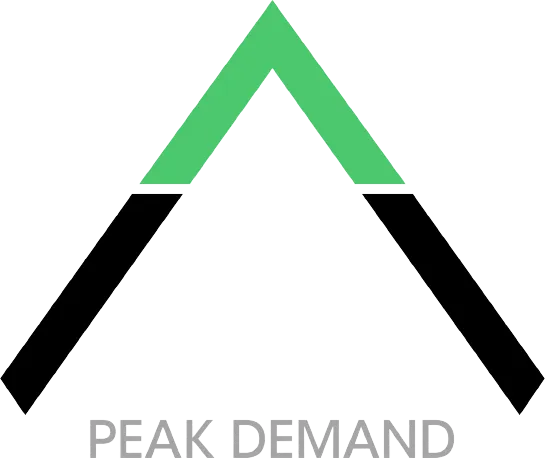Peak Demand Blog

U.S. vs. Canada: Diverging Economic Fortunes Amid Rising Rates
Being next door neighbours doesn't mean the U.S. and Canada are on the same financial playing field. How does it feel knowing that the U.S. economy is going to recover far faster than Canada's?

Summary of the original article at the bottom of this page.
How many headlines are we going to need before reality sinks in?
Rising interest rates are hurting Canadians far more than U.S. consumers as Canadian household debt-GDP ratio compared to the U.S. is much greater, and growing.
We have more debt vs. what we can actually earn in dollars.
In addition, we are seeing a greater relative increase in population and workforce, but much weaker economic activity.
Basically more people in our country who are producing less and less.
What does this mean?

With much of Canadian wealth being tied up in housing, rising interest rates are continuing to spell disaster for our illiquid economy.
People cannot even access the equity they have been paying into their homes, because they cannot sell their home for more, or breakeven for what they bought it for.
What could we have been thinking?
Years and years of buying over asking prices...
Speculation run poisonously rampant.
Did we really believe that housing prices would go up forever - this quickly?

If you bought a house between 2020 and now, ask yoruself this:
"Did wage growth of the average Canadian come anywhere close to the growth in property values? Or even the costs of renting in Canada?
"Did I buy this home with the intention of selling it to someone who could afford it? Or did I purchase this home to sell to an investor who would rent it out?
"Will the investor even find someone who can afford to rent it out?
"Are these rents affordable for someone who cannot afford to purchase a home, but needs somewhere to live?
Was anyone asking these questions before getting into these commitments?
Or does Canada have the best realtors on the planet?
And by best I mean being able to sell absolutely anything for exorbitant prices.
Our economy has been on the real estate gravy train for so long that Canadians have literally forgotten how to do anything else.
Over the past 30 years, investments into technology and innovation have paled in comparison to a real estate market on steroids.
We are desperately paying the price for that now.

Now I would like you to ask yourself...
"Am I the type of person who is going to rely on things like interest rates, the productivity of 'other people' or even a bail out from government, in order to get through this?"
"Or am I someone who is going to take the reign of their financial roadmap, into their own hands?"
If you feel like you are leaning towards the latter, and want to see how an investment into digital 'assets' can completely transform how you secure a financial future...
Contact me.
Until next time.
Alex, Peak Demand
TEXT +1 (647) 691-0082 to chat with our AI assistant 'PeakBot'.
or
Email to PeakBot@email.peakdemand.ca chat with our AI assistant 'PeakBot'.

A summary of the article is included below.
Original Article: Mild recession could quickly get worse without rate cuts: experts
Link to BNN Bloomberg Post: https://www.bnnbloomberg.ca/what-does-a-technical-recession-mean-for-most-people-1.1992079
Summary: The U.S. economy is outperforming Canada's, with significant growth despite both countries facing high inflation and rising interest rates. The Canadian economy is near recession, with GDP stalling, while the U.S. GDP is growing robustly. Factors contributing to this divergence include the structure of household debt and mortgage systems, differences in fiscal policies with the U.S. government injecting more money into the economy, and contrasting levels of business investment and productivity.
Takeaways:
Debt Sensitivity: Higher interest rates are impacting Canadian consumers more due to their larger household debt-to-GDP ratio compared to Americans, leading to reduced spending and economic growth.
Government Spending: The U.S. has a more aggressive fiscal policy, running larger deficits and investing heavily in infrastructure and industry, which stimulates growth.
Investment Discrepancy: U.S. companies are ramping up investments, especially in factory construction, while Canadian companies are cautious, contributing to slower Canadian economic growth.
Productivity Contrast: U.S. productivity is on the rise, contrasting with Canada’s declining productivity, which hampers economic growth.
Interest Rate Outlook: Economic conditions suggest Canada may lower interest rates before the U.S., with potential implications for the Canadian dollar's value.
Peak Demand CA on LinkedIn
@PeakDemandCa on X (Twitter)
@PeakDemandCanada on Facebook
@PeakDemandCanada on Instagram
@PeakDemandCanada on Youtube
Copyright © 2025 Peak Demand - All rights reserved.
This Website is Powered By and Built On Peak Demand

